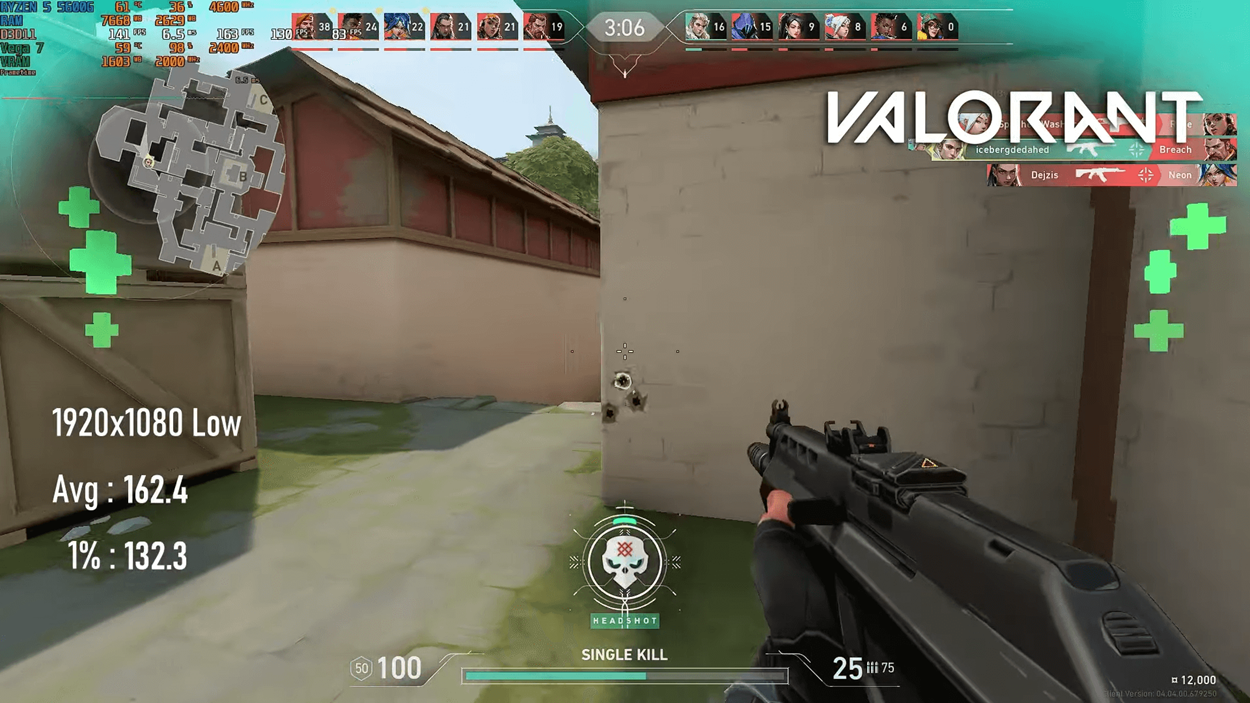What does integrated graphics mean (iGPU/APU etc.)
Integrated graphics is a term used for processors (CPUs) that have a GPU built into them. Integrated graphics uses system memory, which is also shared with the CPU, and the memory is a key factor in determining performance, besides the base and maximum clock speeds (measured in MHz and GHz). Whilst most iGPUs share memory, Intel Iris chips have a small amount of eDRAM memory of up to 128MB to increase performance.
iGPU stands for Integrated Graphics Processing Unit, and is commonly associated with Intel. APU stands for Accelerated Processing Unit, and is associated with the Radeon graphics CPUs from AMD.
Is an integrated graphics CPU good enough for gaming?
iGPUs and APUs are steadily becoming a valid alternative for gamers who do not require high end features like Ray Tracing and beautiful graphics you would see from the RTX 40-series, for example. An integrated graphics CPU will easily allow you to play less demanding games and indie titles, but will also enable you to enter the world of Esports - one of the main genres that they can often excel in. Esports gamers rely on two things overall to be able to enjoy playing: they want decent framerates per second (FPS) and 1080p resolution gaming. The great thing is, most integrated graphics in the latest generation CPUs can do this. Although settings will need to be tweaked, an iGPU or APU makes for a great entry level Esports gaming PC.

A good example is the AMD Ryzen 5 5600G with Radeon Vega 7 graphics, which can handle VALORANT at over 160 FPS using low graphics settings, playing at 1080p resolution. This is testament to developers optimising graphics for a market that has a lot of younger gamers (who don't necessarily have powerhouse PCs).
Best games for integrated graphics
Of course, you cannot expect to play the latest AAA games with an iGPU on any kind of high setting, but you can definitely play a lot of games that are optimised, and certainly plenty of indie titles. There are a plethora of titles have been hailed for their mass market, low budget gaming PC appeal.
Here are some of the best known, less demanding games for iGPUs and APUs: -
- Among Us
- Civilization 5
- Disco Elysium
- Don’t Starve
- FTL: Faster Than Light
- Factorio
- Fallout: New Vegas
- Fights in Tight Spaces
- Firewatch
- Fortnite
- Gang Beasts
- Genshin Impact
- Gunpoint
- Hollow Knight
- Hotline Miami
- Into the Breach
- League Of Legends
- Limbo
- Loop Hero
- Minecraft
- Papers, Please
- Portal 2
- RimWorld
- SUPERHOT
- Slay the Spire
- Star Wars: Empire at War
- Stardew Valley
- Subnautica
- Team Fortress 2
- Terraria
- Warframe
- World Of Warcraft Classic
Does Intel have integrated graphics?
Yes, Intel have a large range of iGPU processors, which use their proprietary Intel UHD technology.
Which Intel CPUs have integrated graphics?
4th Generation Intel UHD integrated graphics CPUs: -
| Intel Core i9-9900K | Intel® UHD Graphics 630 | 350-1200 MHz |
| Intel Core i5-11600K | Intel® UHD Graphics 750 | 350-1300 MHz |
| Intel Core i5-12400 | Intel® UHD Graphics 730 | 300-1450 MHz |
| Intel Core i5-12400F | Intel® UHD Graphics 730 | 300-1450 MHz |
| Intel Core i5-12500 | Intel® UHD Graphics 770 | 300-1450 MHz |
| Intel Core i5-12600 | Intel® UHD Graphics 770 | 300-1450 MHz |
| Intel Core i5-12600K | Intel® UHD Graphics 770 | 300-1450 MHz |
| Intel Core i5-9600K | Intel® UHD Graphics 630 | 350-1050 MHz |
| Intel Core i7-10700K | Intel® UHD Graphics 630 | 350-1200 MHz |
| Intel Core i7-11700K | Intel® UHD Graphics 750 | 350-1300 MHz |
| Intel Core i7-12700K | Intel® UHD Graphics 770 | 300-1500 MHz |
| Intel Core i7-9700K | Intel® UHD Graphics 630 | 350-1200 MHz |
| Intel Core i9-10850K | Intel® UHD Graphics 630 | 350-1200 MHz |
| Intel Core i9-10900K | Intel® UHD Graphics 630 | 350-1200 MHz |
| Intel Core i9-11900K | Intel® UHD Graphics 750 | 350-1300 MHz |
| Intel Core i9-12900K | Intel® UHD Graphics 770 | 300-1550 MHz |
| Intel Core i9-12900KS | Intel® UHD Graphics 770 | 300-1550 MHz |
Raptor Lake processors (higher boost clock speeds)
| Intel Core i5-13600K | Intel® UHD Graphics 770 | 300-1500 MHz |
| Intel Core i7-13700K | Intel® UHD Graphics 770 | 300-1600 MHz |
| Intel Core i9-13900K | Intel® UHD Graphics 770 | 300-1650 MHz |
Is integrated Intel UHD graphics good for gaming?
From the Intel UHD 630 to the UHD 770, there have been processors with integrated graphics that have made for the perfect entry level gaming specification. With perfectly reasonable 60 FPS 720p gaming, and HD/4K video in these 4th Generation chips.
UHD Graphics 770 (IGP, GT1) feature in Alder Lake and Raptor Lake processors, with that offers 32 EUs (execution units) and clock speeds of up to 1.5GHz, and an even higher speed of 1.65 GHz in the Raptor Lake family.
Does AMD have integrated graphics?
Yes, AMD use Radeon Vega and RDNA 2 in their APUs at present, and these cover the majority of desktop processors. AMD are widely regarded as the best in the market for integrated graphics.
Which AMD CPUs have integrated graphics
AMD have long held the title when it comes to fastest integrated graphics, boasting up to 2.2 GHz speeds, and having a much lower thermal output and energy requirement than Intel. For this reason, many people choose AMD over Intel if they are building an entry level (low powered) gaming PC.
| AMD Ryzen 5 4600G | Radeon Vega 7 | Up to 1700 MHz |
| AMD Ryzen 3 5300G | Radeon Vega 6 | Up to 1700 MHz |
| AMD Ryzen 5 5600G | Radeon Vega 7 | Up to 1900 MHz |
| AMD Ryzen 7 5700G | Radeon Vega 8 | Up to 2000 MHz |
| AMD Ryzen 6 7600X | RDNA2 | 400 - 2200 MHz |
| AMD Ryzen 7 7700X | RDNA2 | 400 - 2200 MHz |
| AMD Ryzen 9 7900X | RDNA2 | 400 - 2200 MHz |
| AMD Ryzen 9 7900X3D | RDNA2 | 400 - 2200 MHz |
| AMD Ryzen 9 7950X | RDNA2 | 400 - 2200 MHz |
Are Radeon Vega and RDNA 2 graphics good for gaming?
AMD know how to build an APU, that much is clear. For many years, Intel have been playing catch up, and when it looks like they will finally rival AMD, Team Red bring out their latest RDNA technology - and we're all square again.
Both Radeon Vega and RDNA 2 are excellent APU graphics for entry level gaming, and will handle Esports without breaking too much of a sweat. With the latest AM5 Zen 4 chips, performance has been tuned up to deliver 2.2 GHz of boost, which is a significant amount of graphics power. Expect over 250 FPS in games like VALORANT at 1080p low, or over 160 FPS in Minecraft with high graphics settings at 1080p. For most buyers, this is more than adequate.
RDNA 2 Benchmarks
Summary: Integrated graphics - Intel or AMD?
Whilst we are still far off seeing integrated graphics overtaking dedicated GPUs like the AMD Radeon RX 7900 XTX or superb ASUS Radeon RX 7900 XT 20GB GPU, we are certainly getting our money's worth with AMD's APUs. However, as Tom's Hardware pointed out in a recent article, the best thing to do is upgrade to a dedicated GPU once you start wanting more performance:
"







